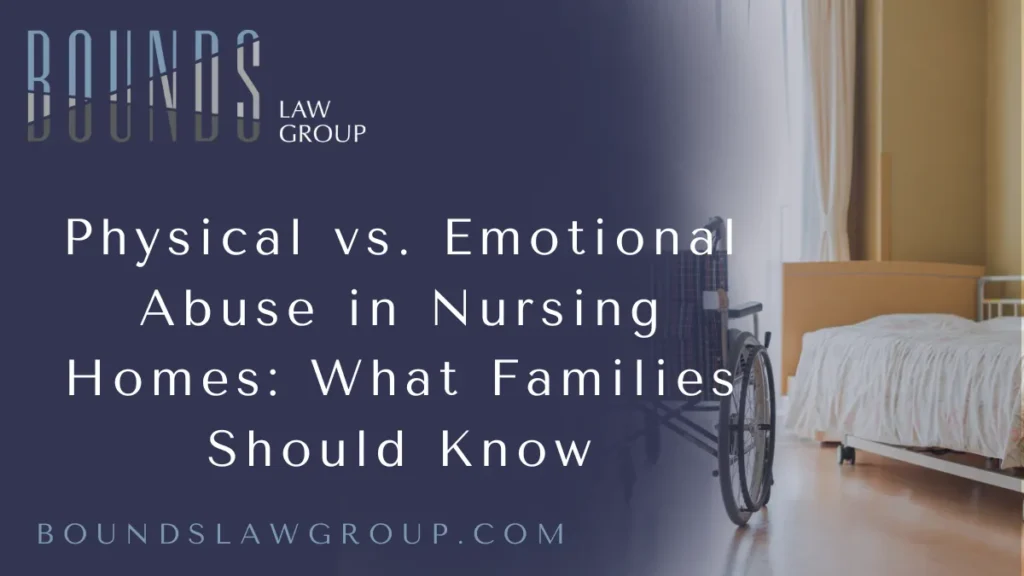
When families entrust their loved ones to nursing homes, they expect compassionate and professional care. Unfortunately, many elderly residents suffer from physical and emotional nursing home abuse, leading to severe consequences for their well-being. Identifying the differences between these two types of abuse is crucial for recognizing signs and taking legal action against responsible parties. At Bounds Law Group, we are committed to protecting the rights of vulnerable nursing home residents. Contact us now at 877-644-5122 or complete the free case evaluation form for expert legal assistance.
Contact us at 877-644-5122 to seek justice today.
Physical and Emotional Nursing Home Abuse
Abuse in nursing homes can manifest in various forms, but the two primary categories are physical and emotional nursing home abuse. While physical abuse leaves visible injuries, emotional abuse can be just as harmful, leading to psychological distress and long-term trauma.
What Is Physical Abuse in Nursing Homes?
Physical abuse occurs when a caregiver or staff member intentionally causes bodily harm to a resident. This abuse can take many forms, including:
- Hitting, slapping, or punching
- Pushing or shoving
- Unnecessary restraint, such as excessive use of straps or sedation
- Burns, cuts, or bruises caused by rough handling
- Force-feeding or withholding food and water
Victims of physical and emotional nursing home abuse may not always report their injuries due to fear, confusion, or cognitive decline. Family members should look for warning signs such as unexplained bruises, fractures, or sudden behavioral changes.
What Is Emotional Abuse in Nursing Homes?
Emotional abuse refers to psychological mistreatment that inflicts distress, fear, or mental anguish on elderly residents. Unlike physical abuse, emotional abuse often goes undetected because it does not leave visible injuries. Common forms include:
- Verbal threats, insults, or humiliation
- Ignoring or isolating residents from social activities
- Manipulation, intimidation, or gaslighting
- Mocking or belittling residents
- Purposefully causing emotional distress to exert control
The impact of physical and emotional nursing home abuse can be devastating. Emotionally abused residents may become withdrawn, depressed, or display signs of severe anxiety. Families should be vigilant for mood swings, changes in appetite, and unusual fearfulness around staff members.

Signs of Physical and Emotional Nursing Home Abuse
Recognizing physical and emotional nursing home abuse early is critical to preventing further harm. Families should stay alert to the following signs:
Physical Abuse Indicators:
- Unexplained injuries (bruises, burns, fractures)
- Frequent hospital visits for similar injuries
- Signs of restraint, such as marks on wrists
- Weight loss due to food deprivation
- Fear or reluctance to be touched
Emotional Abuse Indicators:
- Sudden withdrawal from family and friends
- Avoidance of certain caregivers
- Uncharacteristic anger, sadness, or fear
- Decline in communication or cognitive function
- Lack of interest in previously enjoyed activities
If you notice any of these signs in your loved one, it is essential to take immediate action. Abuse in nursing homes can escalate quickly, leading to severe health complications or even death.
Legal Rights of Nursing Home Residents
Federal and state laws protect nursing home residents from mistreatment, ensuring they receive quality care and respect. Under the Nursing Home Reform Act (NHRA), residents have the right to:
- Live free from abuse, neglect, and exploitation
- Participate in their own medical treatment decisions
- Voice grievances without retaliation
- Access family and legal representation
If your loved one has experienced physical and emotional nursing home abuse, legal action can be taken against the facility or the responsible staff members. Bounds Law Group specializes in nursing home abuse cases, helping families seek justice and compensation for their suffering.
Steps to Take if You Suspect Nursing Home Abuse
If you believe your loved one is a victim of physical and emotional nursing home abuse, follow these steps immediately:
- Document Evidence: Take photos of injuries, collect medical records, and keep notes on behavioral changes.
- Report the Abuse: Contact the nursing home administrator and file a formal complaint.
- Notify Authorities: Report the abuse to Adult Protective Services (APS) or the local Department of Health.
- Seek Medical Attention: Ensure your loved one receives proper medical care.
- Consult an Attorney: Legal representation is crucial to holding the abusers accountable. Complete our free case evaluation form and call us now at 877-644-5122 to discuss your case.

Preventing Nursing Home Abuse: Steps Families Can Take
Families play a crucial role in preventing physical and emotional nursing home abuse. Being proactive can significantly reduce the risk of mistreatment. Here are some essential steps to take:
- Regular Visits: Frequent visits to the nursing home help deter potential abusers and allow families to monitor their loved one’s condition.
- Building Relationships with Staff: Establishing a rapport with caregivers ensures better communication and accountability.
- Encouraging Open Communication: Talk to your loved one about their experiences and let them know they can trust you to advocate for them.
- Monitoring Care Plans: Stay involved in medical and personal care decisions to ensure they receive proper attention.
- Utilizing Technology: Video calls, surveillance (where legal), and scheduled check-ins help families keep a close watch on their loved ones.
By staying engaged and observant, families can help create a safer and more transparent nursing home environment for their loved ones.
Why Choose Bounds Law Group for Nursing Home Abuse Cases?
At Bounds Law Group, we have extensive experience handling cases of physical and emotional nursing home abuse. Our legal team is dedicated to protecting the elderly and ensuring that negligent facilities are held responsible. We offer:
- Comprehensive legal support for families
- Aggressive litigation against abusive nursing homes
- Compassionate guidance through every step of the process
- No fees unless we win your case
Your loved one deserves dignity, respect, and safety. If you suspect abuse, complete our free case evaluation form or call us now at 877-644-5122 to seek justice today.
Sources:
- National Center on Elder Abuse (NCEA) - Provides statistics and resources on elder abuse. Visit here
- Centers for Medicare & Medicaid Services (CMS) - Details federal nursing home regulations. Visit here
- Administration for Community Living (ACL) - Offers information on elder rights and protections. Visit here

